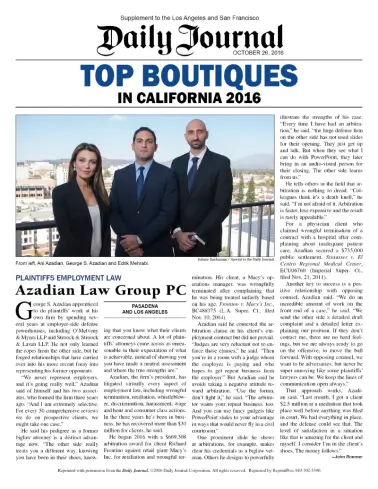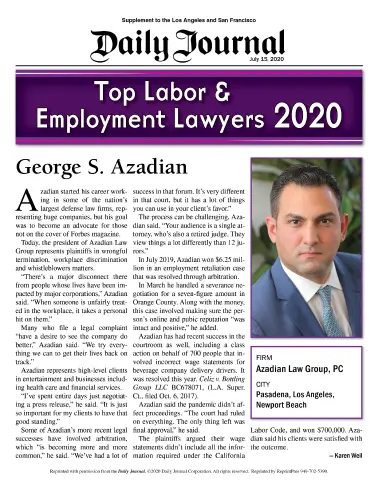California Workplace Discrimination Examples for 2022
Unfortunately, many people working in all industries in California face discrimination in their workplaces. While the Equal Employment Opportunity Commission (EEOC) and the California Department of Fair Employment and Housing (DFEH) uphold strict laws prohibiting workplace discrimination, this behavior persists throughout the state, adversely affecting the lives of many California workers.
If you believe you have been the victim of any type of workplace discrimination in California, it’s vital to not only understand the legal definition of workplace discrimination but also your options for legal recourse after experiencing this type of treatment. An experienced California workplace discrimination attorney is a valuable asset in this situation. Your legal team can help you resolve discriminatory issues in your workplace and secure compensation for any damages an employer has caused.

What Is Workplace Discrimination?
The term “workplace discrimination” refers to an employer making job-related decisions such as hiring and firing based on an employee’s protected personal qualities, such as:
- Race, ethnicity, or national origin.
- Religious affiliation and spiritual beliefs.
- Age.
- Medical status and perceived medical conditions.
- Sex, sexual orientation, or gender expression.
- Disability, perceived disability, or the need for reasonable accommodations.
- Political party affiliation or participation in activist causes.
These are personal qualities protected by the California DFEH and the EEOC laws at the federal level. When an employer engages in discriminatory behavior in the workplace, affected employees have grounds for legal recourse against those employers. Some employers may also face fines and other penalties depending on the scope and severity of their discriminatory actions.
Common Examples of Workplace Discrimination in 2022
Despite robust laws aimed at preventing workplace discrimination in California, many workers throughout all industries still experience unjust mistreatment due to their employers’ discrimination. Some of the most commonly reported examples of workplace discrimination include:
- Refusal to hire applicants based on race, age, sex, or other personal qualities.
- Choosing to promote one employee over another based on personal qualities instead of performance.
- Firing a member of a protected class based on their personal qualities.
- Denying benefits, special compensation, or other perks to certain employees based on protected personal qualities.
- Creating a hostile work environment for employees of a protected class.
- Denying reasonable leave requests based on an employee’s personal identity or status as a member of a protected class.
- Making an employee’s work schedule unreasonably stressful or untenable based on the employee’s status as a member of a protected class.
- Exhibiting favoritism based on personal qualities.
- Denying an employee’s requests for reasonable accommodation related to their status as a member of a protected class, such as refusal to accommodate reasonable religious exemptions to certain policies or accessibility equipment for disabled employees.
Ultimately, workplace discrimination can take many forms, and employers will generally make every effort to disguise their true intentions when discriminating. Therefore, if you believe you have experienced any unjust discrimination in your workplace for any reason, it’s essential to consult an experienced lawyer as soon as possible to determine your best options for resolving the situation effectively.
How Can an Attorney Help With Workplace Discrimination?
Many Californians who experience workplace discrimination lose their jobs and face economic uncertainty due to the prejudiced actions of their employers. In addition, some employees lose their jobs and face other damages without realizing the root cause of these experiences was discrimination until much later. In these situations, legal counsel is an invaluable asset. Your employment attorney can help you hold an employer accountable for discrimination and the damages they inflicted with their discriminatory behavior.
While you can take legal action in response to workplace discrimination, you cannot directly sue your employer for it. The EEOC is the government agency responsible for investigating discrimination and harassment claims, and you must file an EEOC complaint before proceeding with legal action against your employer. The EEOC will review and investigate your claim, issuing you a Notice of Right to Sue if it deems your complaint valid. In severe cases, the EEOC may initiate legal proceedings against an employer at its discretion.
FAQs
Q: How Will California’s Workplace Laws Change in 2022?
A: California recently passed new legislation to increase the minimum wage for California employees. When it comes to workplace discrimination, the California DFEH enforces a wide range of rules and regulations that all employers must follow or face liability for discrimination claims and severe penalties. If you have any concerns about discrimination in your workplace, it’s good to speak with an experienced attorney as soon as possible.
Q: Can I Receive Compensation for Workplace Discrimination?
A: You have the right to hold an employer accountable for discrimination and any economic losses you incurred due to their actions. Most discrimination claims will seek compensation for lost income and benefits. However, employees also have the right to seek compensation for their emotional distress, and employers may be liable for punitive damages and other penalties.
Q: Do I Need a Lawyer to Sue an Employer for Discrimination?
A: While it is technically possible to file a discrimination claim with the EEOC on your own, the process is much easier with the help of an experienced lawyer. Additionally, an attorney can help with a subsequent civil claim against your employer after you have received the Right to Sue from the EEOC.
Q: What If My Employer Denies Discrimination?
A: Employers accused of workplace discrimination typically lean on California’s at-will employment law to justify firing decisions and may employ many excuses to cover their intentions. Your attorney can help you determine how to obtain the evidence you need to prove you were the victim of workplace discrimination, which may include records of correspondence with your employer and statements from your coworkers.
No one should experience workplace discrimination in California, but unfortunately, many people do face discrimination of all kinds from their employers. If you are unsure whether you have grounds for a discrimination claim or need help with an EEOC complaint, the Azadian Law Group, PC, can assist you. Contact us today to schedule a consultation with an experienced California employment lawyer.
Categories
- Disability Discrimination
- Retaliation
- Race Discrimination
- FMLA
- Wrongful Termination
- Disability Leave
- Labor & Employment
- Pregnancy Discrimination
- Consumer & Class Actions
- unpaid overtime
- Age Discrimination
- Whistleblowing & Retaliation
- Discrimination
- Fair Pay
- Workers' Rights
- Employment
- Equal Pay Laws & Issues
- Wage & Hour Violations
- Hostile Work Environment
- Sexual Harassment
- Awards
Why Choose Azadian Law Group?
Azadian Law Group is highly regarded as one of the best wrongful termination lawyers in Los Angeles. Due to our proven success and results that very few employment lawyers have obtained, we are able to bring significant leverage to the negotiating table.
Schedule Your Free Consultation Now

Related Blog Posts
Discrimination in the workplace can be an emotionally exhausting and financially damaging experience. If you believe you have been treated...
Read MoreWorkplace discrimination can manifest in various forms, subtly or overtly, undermining an employee’s performance, career progress, and self-esteem. In Los...
Read MoreIn the bustling and diverse landscape of Los Angeles, workplace discrimination poses a significant challenge for employees across various sectors....
Read MoreTypes of Employment Cases We Handle in California
The following presents an overview of the broad range of employment law cases that our employment attorneys are experienced at overseeing and favorably resolving.
Wrongful Termination
Wrongful Termination Lawyers in Los Angeles, CA Attorneys at Azadian Law Group who have filed wrongful termination lawsuits acknowledge that unfair termination can significantly impact an employee’s life. It can…
Age Discrimination
Age Discrimination Lawyers in Los Angeles, CA Azadian Law Group, PC regularly represents clients throughout Los Angeles, CA, who are the victims of age discrimination in the workplace. At Azadian…
Pregnancy Discrimination
Pregnancy Discrimination Lawyer in Los Angeles, CA At Azadian Law Group, PC, our pregnancy discrimination lawyer in Los Angeles, regularly represents clients who are the victims of pregnancy discrimination in…
Sexual Harassment
Sexual Harassment Attorney in Los Angeles, CA The Los Angeles Sexual Harassment Lawyers at Azadian Law Group, PC know that in today’s modern era some people often make the mistake…
Racial Discrimination
Racial Discrimination Lawyers in Los Angeles, CA Azadian Law Group, PC regularly represents clients throughout Los Angeles who are the victims of racial discrimination at work. The Los Angeles Race…
Disability Discrimination
Disability Discrimination Attorneys in Los Angeles, CA There is a misconception that disabled people do not want to work or that disabled individuals simply cannot or will not be as…
Praise from Our Clients
AS
JA
OM
AC
TA
AG
MZ
1ศม
DG
RT
N
M
MM
JJ
KM
VB
SR
CG
JL
NS
CW
KG
ES
SL
TR
GA
CA
MH
PG
JA
S
GN
LD(
AA
CA
MM
AW
A
JJ
DB
DA
SM
KK
PW
MJ
CP
SS
WR
DM
PD
PP
AF
PZ
AJ
GC
KD
AO
AC
A“TH
LS
TP
JG
RS
L
RK
D
SD
KN
HM
RM
KM
LAL
QT
BS
KJ
RM
VM
W
JS
DP
TP
KW
SD
HLC
KR
TM
DNG
CF
SM
GA
SM
PD
GC
LS
SS
YU
TCG
VV
AA
SC
PC
VS
DV
MS
LA
EC
MP
SS
RC
MS
Who We Represent
At Azadian Law Group, we are dedicated to upholding the rights and interests of employees in the workplace. Our expertise in employment law positions us as staunch advocates for those facing unjust treatment in their professional environments.
Whether combating workplace discrimination, addressing unfair termination, or negotiating equitable compensation, our team is committed to ensuring that every employee we represent is treated fairly and respectfully under the law.

Step 1
Explore our comprehensive range of legal services to find the specialized support you need.
Step 2
Arrange a free initial meeting with our experts to discuss your legal situation.
Step 3
Receive a custom strategy specially created for your case by our legal experts.
Call Us Now 213-229-9031
Tell Us Your Story
Speak out for justice. Your story can be the start of a new chapter of workplace fairness.


